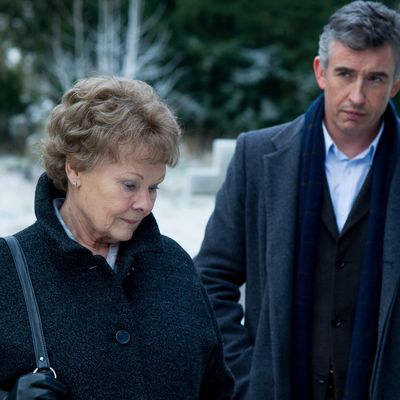
Among the more heartrending tales in the sorry annals of the twentieth-century Catholic Church is of tens of thousands of “bad” Irish girls virtually enslaved by the good sisters of the Magdalene asylum-cum-laundries. Until those damnable institutions closed forever in 1996, young women worked eight to ten hours, 364 days a year, worn down by taunting lectures on the evils of the flesh and frequent beatings. They were also forced to give up all rights to their out-of-wedlock children. Peter Mullan’s 2003 The Magdalene Sisters was too arty and grueling to get much traction outside Ireland and the U.K., but the new Judi Dench–Steve Coogan vehicle Philomena is just the sort of awards-bait weeper (with laughs) to cross over to a biggish audience. Directed by Stephen Frears from a script by Coogan and Jeff Pope, the movie is overcalculating and occasionally coarse, but it has a gentle spirit. We should count its existence as a blessing.
Philomena is real — I heard her go on at charming length after a recent screening — and is the subject of a book called The Lost Child of Philomena Lee by Brit journalist Martin Sixsmith. A former nurse, she reportedly got tipsy on sherry one night in 2004 and let go of a secret she’d kept for half a century: In 1952, she gave birth to a son at Sean Ross Abbey, a convent in Tipperary county, and was compelled to sign the lucrative adoption rights over to the Superioress, Sister Barbara. Three years later, the boy, Anthony, was taken from her — on Christmas Day, no less. Now she wanted to find him with all her soul. Sixsmith heard the story from a friend of Lee’s daughter. Having nothing else to do at the moment — he’d been thrown under a bus by the Blair administration — he decided to chronicle Lee’s search.
Coogan plays Sixsmith, who’s made extra snobbish and unpleasant to fit snugly into the actor’s limited range. This creates a crowd-pleasing mismatched-buddy vibe as the Oxford-educated writer (chagrined at having to write a “human interest” story to pay the bills) and the working-class Philomena motor around Ireland and, later, the U.S. She fills him in on the plots of sundry romance novels, he rolls his eyes at her simplemindedness, she proves she sees more than he thinks she does. Less hokey is their conflict over the presence/absence of God. Sixsmith makes little distinction between a belief in a supreme being and in the liars, opportunists, and criminals who exist at all levels of the church. Philomena, despite the cruelty she has endured, persists in accepting both the Trinity and the legitimacy of its material-world emissaries. Some of them, anyway.
Dame Judi doesn’t transcend the over-tidy script, but she de-banalizes it. Her elfin face is here soft and guileless; her eyes shine. She lets us see that Philomena’s idle chatter — her homilies, her breathless plot synopses — isn’t so idle after all. It’s her stubborn romanticism and sense of wonder that has pulled this woman though. Philomena fights every day against the idea of her own guilt. As a girl, she didn’t know not to let boys touch her private parts — because neither the sisters nor her church-fearing relatives told her what they were for. (“I didn’t even know I had a clitoris, Martin.”) And if there’s no sex education, how can you know where the caresses of a handsome, attentive boy at a carnival will lead? In flashbacks, Philomena is played by a radiant, pink-cheeked lass named Sophie Kennedy Clark, and though she doesn’t quite match up with Dench in your mind’s eye, she’s awfully moving.
Possibly you know — from news accounts — where Philomena’s journey leads. If not, I’ll let you discover the outcome for yourself. I will say that there turn out to be several varieties of sexual repression in the film and that the ironies multiply: You can’t, as the saying goes, make this stuff up. It’s also fascinating to note that, however tyrannized our own politicians might be by the religious right, the U.S. comes off far better than the Old Country. The most chilling scenes in Philomena are at the abbey where the child was born. A few decades ago, it took all the birth and adoption records and had itself a nice bonfire. Now, church administrators have learned to lie gracefully. (“We can’t take away your pain but we can walk you through it …”) When Coogan’s Sixsmith makes a stink and uses foul language in the presence of elderly priests and nuns, he’s treated as something of a lost soul, but at least one viewer wished he’d smashed a few stained-glass windows.
Director Frears isn’t given to torturing the audience à la Mullan in The Magdalene Sisters — or, for that matter, Frears’s fellow Englishman, Steve McQueen, in 12 Years a Slave. He isn’t a Catholic, either, so he’s not working out any of his own childhood traumas. Frears’s tender, somewhat impersonal touch keeps Philomena from becoming too much of an anti-Catholic harangue, which is probably for the best. The real Philomena Lee can see the movie with her fellow parishioners and not be viewed as a troublemaker. She can go to her grave knowing that she killed her oppressors with kindness.





